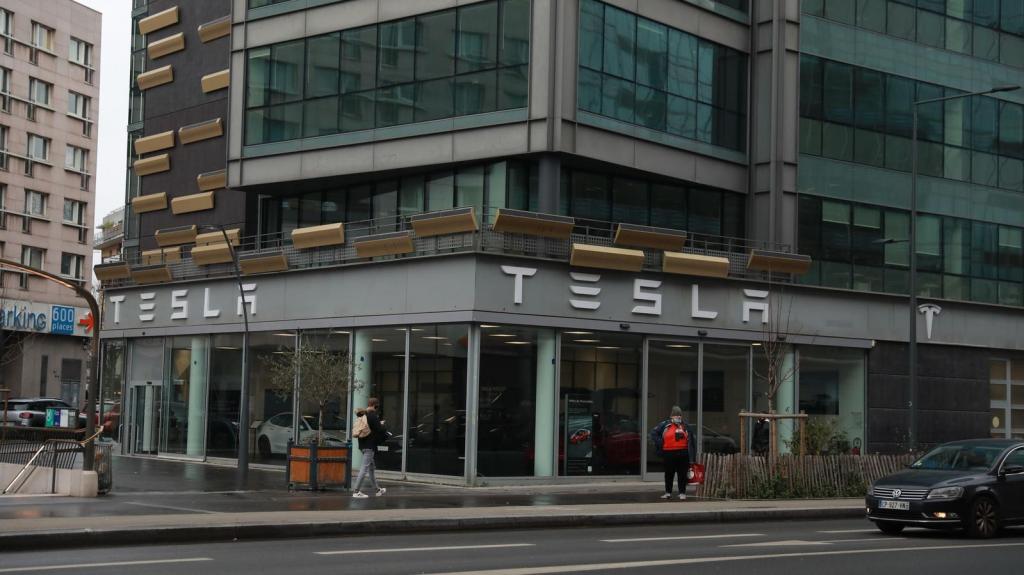Tesla's European Sales Plummet Amid Political Controversy
Tesla faces a 45% decline in European sales as competition rises and political controversies cloud its market image. Discover the implications now.

Key Points
- Tesla's sales in Europe fell by 45% in January, marking a significant decline in market share amid rising competition.
- Elon Musk
's controversial political involvement appears to be alienating consumers, with many potential buyers expressing hesitance towards the brand.
- The growing demand for EVs and new market entrants highlight the need for Tesla to adapt its strategies to regain consumer trust and interest.
Tesla has long been a shining star in the electric vehicle (EV) sector, celebrated for its innovative designs and cutting-edge technology. However, recent reports indicate a startling drop in sales within Europe, raising concerns about the brand's future and market position. In January, Tesla managed to sell just under 10,000 vehicles across Europe, a staggering decline of 45 percent compared to the same month last year. This article delves into the reasons behind this decline, its implications, and what it could mean for Tesla moving forward.
Significant Market Shift: What the Numbers Say
According to data from the European Automobile Manufacturers’ Association (ACEA), Tesla’s share of the overall market has plummeted from 1.8 percent to a mere 1 percent. This decline occurred despite a growing market for battery-electric vehicles, which saw a 34 percent increase in sales across the continent. In stark contrast, Tesla's sales were down while the overall EV market flourished, highlighting a critical disconnect between the brand and its consumer base.

The Musk Factor: Politics and Public Perception
The sharp decline in Tesla's sales cannot be examined in isolation from its CEO Elon Musk’s recent political activities. Musk has become increasingly involved in political commentary both in the US and Europe, endorsing controversial figures and parties, including the far-right
(AfD). Observers suggest that his political stance may be alienating customers, as indicated by surveys revealing that up to 60 percent of potential car buyers feel put off by Musk's polarizing reputation.
Further, Tesla's recent sales figures tell a cautionary tale. In Germany alone, Tesla sold only 1,277 vehicles in January, marking its worst monthly total since July 2021. This downturn came amidst a backdrop of political tensions, prompting many consumers to reconsider their purchasing choices.

Competitive Landscape: Rising Alternatives
The EV market is more competitive than ever, with brands like BYD and
significantly increasing their footprint. In January, new battery-electric car sales soared across Europe, leaving Tesla grappling with its reduced sales numbers. As traditional automakers ramp up their EV offerings and new entrants challenge the status quo, Tesla finds itself at a crossroads.
What’s more, EV sales in the EU are growing at remarkable rates, reported to be nearly 166,000 units—an indicator that the appetite for electric vehicles is stronger than ever. As the market expands, consumers are exploring their options, which could mean a tougher battle for Tesla moving forward.
Looking Ahead: A Time for Reflection and Adaptation
As Tesla faces what could be viewed as a significant turning point, it’s crucial that the organization reassesses its strategies. While the brand has successfully pioneered the EV revolution, relying solely on past successes may no longer be viable. Tesla must work to rejuvenate its brand image and strengthen its relationship with consumers, especially in light of emerging competitors.
With growing consumer choice and values shifting, Tesla might benefit from adopting policies reflecting the evolving expectations of customers. This could include enhancing product offerings, ensuring better customer engagement, and taking a more neutral stance in political matters to avoid alienating potential buyers.
The current situation serves as a wake-up call for not just Tesla but for all businesses navigating the rapidly changing landscape of consumer preferences and values. In an era where consumers increasingly care about corporate responsibility and leadership attitudes, brands must take heed of how their executives represent them.
The decline in Tesla’s sales in Europe presents an opportunity for introspection and growth. By realigning with consumer needs and staying ahead of market trends, Tesla has a chance to regain its footing and lead the EV movement once more. This story is far from over, and the potential for rejuvenation remains bright.


